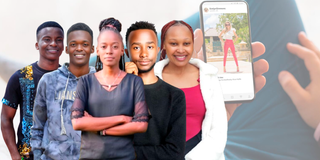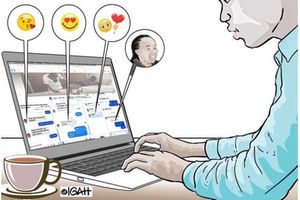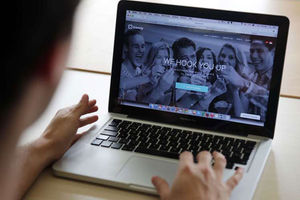
From left: Mugwero Criticos Onyango, Mark Muriuki Mwai, Mercy Ochieng’, Brenda Nkirote and Jeremy Muthomi.
Love has always been complicated, but in today’s digital age, the rules have changed. Once, romantic connections began with chance encounters, shy smiles, and heartfelt letters. Today, love is just a swipe away.
Dating apps like Tinder, Bumble, and Hinge have inserted themselves firmly into the love stories of Gen Z, redefining the way people find, nurture, and perceive romantic relationships. But in this algorithm-driven approach to connection, one question lingers: Are these apps killing romance as we know it, or are they simply transforming it into something new and equally meaningful?
For young people, the digital natives who grew up with smartphones in their hands, love is no longer limited by geographic boundaries. Online applications offer instant access to a pool of potential matches, people you might never meet in your daily routine. It is thrilling, efficient, and endlessly customisable. With bios, curated photos, and even prompts designed to spark conversation, dating apps present the promise of love packaged neatly inconvenience. But isn’t it all too easy? Too impersonal?
Critics argue that swiping for love is more transactional than emotional. This “gamification of romance”, where profiles are dismissed with a flick of a finger, can leave users feeling disposable. The emphasis on first impressions, based on photos, height, or a witty one-line intro, seems to turn something profound into a surface-level selection process. Some feel that the magic of romance has been replaced by algorithms and dopamine-fueled matches that often fail to deliver long-term connections, as has been evident in the past.
But supporters of dating apps insist the technology isn’t killing romance—it is merely expanding it. Online dating platforms, they say, allow users to connect beyond their social circles, explore shared values, and meet people they might otherwise never encounter. For many, these apps represent hope, a new way of finding love that aligns with the fast-paced, tech-centred world Gen Z inhabits.
So, what’s the truth? Is digital dating a soulless shortcut or a revolutionary tool? To answer this, we turn to five youngsters who share their personal experiences on the joys, frustrations, and unexpected lessons they’ve learned while searching for love in a digital world.
Mugwero Criticos Onyango, 21

Mugwero Criticos Onyango.
I think dating apps and online dating have revolutionised how people meet and form relationships, and that is why there is debate on whether they are killing romance and intimacy or redefining them.
There are so many people using the apps these days, so to me, it is an unstoppable force. The era of face-to-face interactions is over. Virtual platforms are the in thing, although I agree that it can sometimes feel transactional.
What I like most about dating apps is that they allow users to choose the kind of person they want. That is a new dynamic in modern relationships.
Online dating has not necessarily killed romance, it has simply forced us all to perceive intimacy and relationships differently. Unfortunately, by giving people the freedom to seek love at any time, these apps have encouraged instant hookups that often prioritise short-term gratification over long-term commitment. The abundance of choices on these platforms may also limit individuals from fully committing to one partner, which could increase cases of infidelity.
Despite this, some users find lifelong partners on dating apps. I believe that whether a relationship starts online or otherwise, whether it will last or not depends solely on the individuals involved. Their intentions—whether focused on marriage or instant gratification—play a crucial role in shaping the intimacy and longevity of the relationship.
Dating apps are not destroying romance but reshaping it. While they facilitate quick connections, they also offer opportunities for meaningful relationships, depending on users' motives. The longevity of a romantic relationship lies not in the method of meeting but in how two people engage and their compatibility. Genuine connections can thrive regardless of the platform, as long as both individuals are committed to something meaningful.
Mark Muriuki Mwai, 20

Mark Muriuki Mwai.
Virtual dating does not kill romance; it redefines it to align with modern lifestyles and societal changes. While some argue that dating apps reduce what should be serious relationships to swipes and superficial judgments, I see them as valuable tools for connecting in an increasingly fast-paced world.
The visual appeal and instant gratification that dating apps offer may indeed encourage fleeting emotional connections. Users may be tempted to quickly move on to the next option rather than invest in nurturing relationships. This may cause a rise in casual dating, hookups and cases of ghosting since dating apps don’t lay any emphasis on commitment and genuine romance.
However, these platforms have changed the dating scene. Those who are shy or face challenges connecting through traditional methods stand to benefit a lot. For those from minority or marginalised communities, such as people living with disability, dating apps can provide safe spaces to find partners.
Also, dating apps allow users to filter potential matches based on shared values, interests, and relationship goals. This saves everyone time and money.
I don’t think romance is defined solely by how people meet. It is all about how they nurture their relationships. While dating apps provide the initial spark, the depth of romance depends on the individuals involved. Many of the successful, long-term relationships of today started on these platforms. That should tell you something.
In my opinion, dating apps are neither good nor bad. They just reflect the changing dynamics of human interaction in the digital age. Whether they kill or redefine romance depends on how they are used and the intentions of the individuals using them. With the right mindset, dating apps can lead to both instant connections and long-lasting relationships.
Mercy Ochieng’, 20

Mercy Ochieng'.
Matters of the heart have always been dicey. The quest for a perfect match or soulmate is an enduring desire, especially among the youth, which is why these apps exist in the first place. These apps introduce both opportunities and challenges.
For one, they provide platforms for people to meet and connect, although they can cause users to overlook crucial elements like honesty and transparency, which are pivotal for successful relationships.
Fake profiles and dishonest individuals are spread all over those platforms, and this is because online dating focuses on outward appearance and material things. This makes the apps a playground for greedy individuals and those with selfish motives. It is no wonder many have undergone emotional distress after investing their feelings and emotions only to find out that they were tricked.
Another downside of dating apps is that they contribute to low levels of commitment. The physical distance between potential couples sometimes reduces the need for emotional investment, and in some cases, encourages unfaithfulness. These issues not only weaken bonds but also result in emotional turmoil, with many experiencing distress and even depression due to unmet expectations.
Brenda Nkirote, 23

Brenda Nkirote.
Dating apps have become a dominant force in the search for love. These platforms offer unmatched ease of access to potential partners. This convenience, however, comes at a cost.
Nowadays, meeting new people is incredibly easy, which I think diminishes the romantic experience. This ease can result in superficial interactions since partners put in little effort to build deeper connections. But that is not to say that dating apps are killing romance. They are just transforming it to align with modern lifestyles. For instance, people are very busy these days. The apps therefore come in handy.
The biggest plus is that dating apps allow one to curate their profiles and initiate conversations at their own pace. This removes the anxiety often associated with initial interactions. For Gen Zs, these platforms provide access to a wide pool of potential partners, enabling them to find individuals who align closely with their preferences.
Jeremy Muthomi, 22

Jeremy Muthomi.
Dating apps are killing romance. In the past, finding a partner required patience and effort. Partners had to take the “long way,” which involved going out, meeting someone new, talking to them, and expressing a desire to date.
Whether at markets, malls, or social events, you had to interact physically with people. After meeting someone you were attracted to, you would go on several physical meetings to know them better.
This allowed partners to discover each other’s interests, desires, and expectations in the relationship. It helped couples gauge whether they were compatible.
Now, people simply download a dating app, upload a profile, state their preferences, and quickly get a match.
I know of people who don’t bother attending social events to meet new people because they see dating apps as an easier alternative.
Bear in mind also that for those using dating apps, if things don’t work out, they can simply return to the app and find another partner—a match is always just a swipe away. This is not how romantic relationships are meant to be.
Dating apps rarely provide the opportunity to develop authentic, lasting, and meaningful emotional connections. People rush through the process, often realising later they are not even truly attracted to their match.









